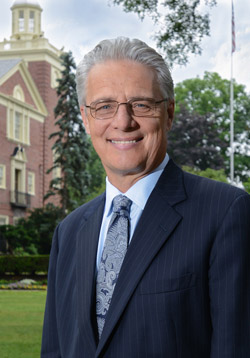You are here:
President's Message: Leading the liberal arts into the future

President Kent Trachte
Lycoming College has made a bold decision. The College has chosen to deepen its identity as a liberal arts college by developing a high impact 21st-century liberal arts education. We are certain this is a strategically smart course of action.
Stories about higher education in the popular press regularly question the relevance of the liberal arts in this era of technological revolution. This coverage is often accompanied by the suggestion that we are about to see a wave of closures of liberal arts colleges, implicitly suggesting that many institutions face an imminent demise.
There are some reasons to be concerned about the future of the liberal arts college. The National Center for Education Statistics has reported that the percentage of undergraduate degrees granted in homeland security, parks and recreation and health care rose from nine percent in 2005 to 17 percent in 2015.
At the same time, the number of humanities degrees has dropped to only 6.1 percent of bachelor’s degrees awarded — the lowest level since record-keeping began in 1948.
In addition, many liberal arts colleges have suffered enrollment declines since 2010, when the number of high school graduates peaked in the United States. On average, enrollment has dropped by 75 to 90 students at institutions ranked between 100 and 240 in the U.S. News & World Report national liberal arts category.
Facing these trends, many residential liberal arts colleges have made the decision to move away from a focus on the liberal arts and add majors in the health sciences, security studies and recreation, as well as online options. Others have decided to add graduate programs and have evolved into small universities (several schools in the Middle Atlantic Conference are examples). A 2012 study that appeared in the publication Liberal Education found that the number of institutions meeting the definition of a liberal arts college dropped from 212 to 130 between 1992 and 2012. While a lot of public attention has been focused on closures, curricular change has been much more common: broadening offerings beyond traditional liberal arts fields, adding professional programs and developing graduate and online programs.
In 2013-14, we collectively developed a Strategic Plan that chose a different path for Lycoming College. We recommitted ourselves to the historical traditions of the College and to the aspirational goal of becoming recognized as “one of the very best liberal arts colleges in the country.” We took the bold course of action, and the right course of action.
Choosing to remain committed to the liberal arts does not mean that Lycoming has been standing still. Since 2013, we have launched the Center for Enhanced Academic Experiences, which plays a lead role in executing our vision that a 21st-century liberal arts education must combine the long-standing focus on depth and breadth with the power of experiential learning (internships, international study, community-based learning, and research with faculty). We have also added new academic programs that are within the liberal arts and that focus on critical 21st-century issues: neuroscience, entrepreneurship and energy studies while also making additional investments in environmental science and the Clean Water Institute. We have developed the capacity to recruit a more culturally diverse, national and even global student body. We have improved the physical campus through the construction of the Lynn Science Center, the complete renovation of three residence halls and many other smaller projects. We have raised more than $51 million through the Campaign for a Greater Lycoming.
Lycoming has not, however, been immune to the forces that are adversely impacting residential liberal arts colleges. Nonetheless, there are indicators of progress toward our aspirational vision of being recognized as one of the best. This spring, we were named one of the Best 382 Colleges and Universities by the Princeton Review and also received the Colleges of Distinction designation. Our ranking in U.S. News & World Report improved by seven spots this year for a total increase of 17 spots in just two years. For the first time in the College’s history, we have received institutional grants from the Mellon Foundation, the National Science Foundation, the Hearst Foundations and the Booth Ferris Foundation. Leading organizations involved in the higher education sector have been affirming the rising quality of Lycoming College.
A recent book by Stanford University political science major Scott Hartley and venture capitalist offers a perspective that supports my contention that Lycoming’s course has also been strategically smart. In “The Fuzzy and the Techie: Why the Liberal Arts Will Rule the Digital World,” Hartley argues that those who will lead innovation in the emerging data age will not be people who possess strong technical skills but rather those who understand human nature and the functioning of communities and societies — people who have received a liberal arts education. For these liberal arts graduates are the ones who can identify the human problems that need to be addressed and the social dysfunction that needs to be corrected. Working with people possessing technical skills, liberal arts graduates will find in Hartley’s words “the optimal ways to incorporate intelligent nimble machines into our lives.”
Like Hartley, Lycoming College sees the liberal arts as the key not only to understanding the past but to leading human societies into the future. We have committed to deepening and strengthening our identity as one of the best liberal arts colleges of the 21st century.
I want to thank you for supporting this extraordinary institution as Lycoming leads the liberal arts into the future.
Sincerely,
Kent C. Trachte, Ph.D.
President